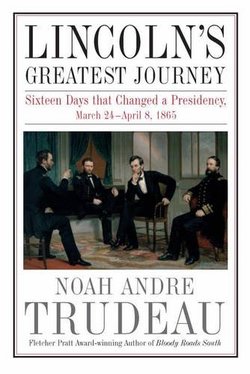
Noah Andre Trudeau
Savas Beatie, 2016, 360 pgs., $32.95
ISBN: 978-1611216-26-3
Image courtesy of amazon.com
When the Civil War was coming to a close, there was much to do in the face of reconstruction especially in the eyes of Abraham Lincoln. It seemed that no matter what, the pressure was on him to construct new policies which would lead to reconciliation. While there are those who have studied the last days of Lincoln’s presidency, they all seem to come up short. Now, with Lincoln’s Greatest Journey, that information is more delved into. Noah Andre Trudeau takes us along with Lincoln through the last days of the war which are fairly important to the events which would come after. Through this book, the drama and tragedy of the end comes full circle and we can see into the realm of not just Lincoln but the soldiers and commanders around him.
Noah Andre Trudeau is a familiar name to many Civil War readers and historians. He has written eight books, Lincoln’s Greatest Journey will be his ninth, and all have received critical acclaim. His first book was Bloody Roads South which won him the Fletcher Pratt Award from the New York Civil War Round Table. Other familiar titles are Like Men of War, Southern Storm, Gettysburg: A Testing of Courage, and The Last Citadel: Petersburg June 1864 – April 1865.
This book encompasses sixteen days in the presidency of Abraham Lincoln, from March 24th to April 8th, 1865. Trudeau pays incredible detail to each of these days, and while the study is from those dates, he does not leave the reader without some background. The opening chapter spans the months from January to March in order for the readers to have a better understanding of what will come on March 24th of 1865. Once he begins to delve into those dates, however, you begin to see why they are so important to Lincoln’s presidency. But these events do not just talk about Lincoln, they give information of those involved on both sides. When March 25th is written about, it opens with Lincoln on the River Queen, but also talks about what is happening in Petersburg. He gives details of the Confederate movements and their plans in those final days. One of the parts of the book which seemed to affect me as a reader was seeing the last days of the Petersburg siege through the eyes of Lincoln. You read the correspondence between the president and his high ranking commanders. Something about the narrative here gave me a different outlook on the way the final battles were happening. I have read quite a few books on the Civil War and I have never read such a narrative of battles through the eyes of the president such like this. By the end of the Civil War, there was no doubt that Lincoln was a tired man, but here, the feeling of his exhaustion is not only well written but felt as the narrative flows to the end of these days.
Another one of the highlights of this book for me was the battle narratives, especially on April 2nd. Trudeau not only handles one battle with ease, but three. The assaults on Fort Gregg, Fort Mahone, and the Sixth Corps assault were handled masterfully. And on top of the battles being described well, we still get the outlook from Lincoln here. This made the book more of a page turning experience. As the days go on, we get some naval details as well which other authors have struggled with, but Trudeau handles beautifully. When the book nears its close with April 8th, there is a feeling of tumultuous peace. Everything seemed to be on in place for the war to end, yet the fighting was still heavy. When Lincoln returns to Washington and meets Seward, it feels like the end, yet we know as readers that the end is not here. Grant is headed to Appomattox and Sherman has even more work in the lower south. And there is still the tragedy of the reconstruction.
Words cannot describe how much I recommend this book. It has been some time since I have been emotional reading a non-fiction work and yet as these days were described, I could not help but get emotional not only from the president, but from the soldiers who were fighting this waning war. Lincoln’s Greatest Journey is a welcome addition to the Civil War world, but also, it is a welcome addition to those who want to study Lincoln himself. Trudeau’s narrative is amazing; it evokes a different type of narrative in recent studies. It touches you on a scale which, as I stated before, I cannot describe.
 RSS Feed
RSS Feed
